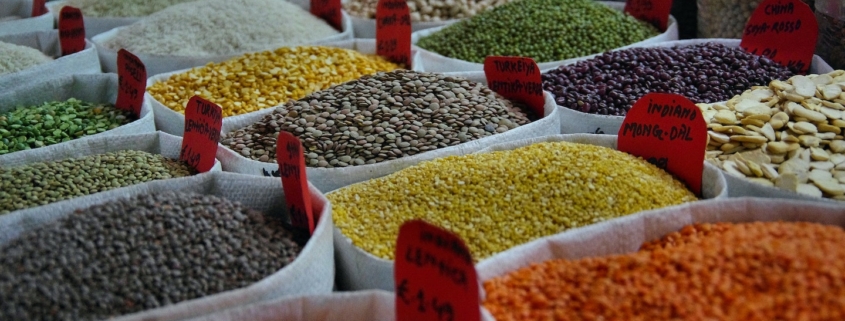Fueling Up for a Festive Fourth of July with Beans & Seeds
 Break out the red, white, and blue! It’s almost the fourth of July, the biggest barbecuing holiday. No celebration is complete without hot dogs, hamburgers, corn, and you can’t forget the baked beans! Before the festivities on the Fourth of July commence, another national holiday deserves its fair share of recognition: National Bean Day on July 3rd!
Break out the red, white, and blue! It’s almost the fourth of July, the biggest barbecuing holiday. No celebration is complete without hot dogs, hamburgers, corn, and you can’t forget the baked beans! Before the festivities on the Fourth of July commence, another national holiday deserves its fair share of recognition: National Bean Day on July 3rd!
Did you know that beans are also known as legumes? Legumes are seeds, pods, or other edible parts of a plant used as food. Legumes are rich in fiber, protein, antioxidants, vitamins, and minerals, as well as isoflavones. Each of these nutrients provides unique health advantages.
Beans aren’t the only plant food that you should be snacking on this summer. Seeds are a great snack for those on the go, such as when you’re going on a hike. They are rich in fiber, antioxidants, and essential fatty acids.
Benefits of Beans
Beans have been a staple of various cuisines around the world for good reason. Not only are beans delicious, but they also pack a hefty nutritional punch. Check out some of their benefits below:
Fiber: Beans can contain between 3-19 grams of fiber per ½ cup serving depending on which type you choose. The fiber content of beans helps to lower bad cholesterol, lower spikes in blood glucose, increase satiety, decrease the risk of cancer, and help to regulate the digestive tract.
Protein: Try and replace some of your animal protein with beans. Not only is this less expensive, but they are also devoid of saturated fat.
Antioxidants: Richly colored dried beans offer a high degree of antioxidant protection. In fact, small red kidney beans have a higher amount than blueberries! Antioxidants help to destroy free radicals in your body, thus reducing your risk of cancer.
Vitamins & Minerals: Beans contain large amounts of thiamin, folate, vitamin B6, and niacin which have plenty of health benefits to promote wellness. Other essential nutrients include calcium, iron, magnesium, potassium, phosphorus, zinc, and manganese.
Isoflavones: While there is a high amount of isoflavones in soybeans, many other beans have these compounds as well. While research is still being done on studying the health benefits of these compounds, they may ease symptoms of menopause, reduce the risk of heart disease and some cancers such as breast cancer and improve bone and prostate health.
Seeds of Goodness
While sunflower seeds are the most popular summer snack thanks to baseball, there are tons of other seeds worth checking out. Every seed has a different nutritional profile, check out some popular options below:
Flax Seeds: Not a fish eater? No problem. Many vegetarians and those who do not eat fish can get some of their omega-3 fatty acids from flax seeds. Omega-3 fatty acids reduce your risk of heart disease, particularly sudden cardiac death, by lowering blood cholesterol and triglyceride levels, stabilizing irregular heartbeat, and lowering blood pressure. Flax seeds contain fiber, vitamin E, and calcium. To get the benefit from flax seeds, they must be crushed. Try grinding them in a blender or food processor or purchase milled flaxseed. Sprinkle on cereal, add to smoothies, yogurt, or mix with flour in baked goods.
Chia Seeds: These small white seeds contain more omega-3 fatty acids than any other seed! They also contain high concentrations of fiber, protein, iron, and calcium. Eating just 2 tablespoons of chia seeds will increase the amount of oxygen throughout your bloodstream to help nourish cells and organs. Chia seeds do not need to be ground up to make the nutrients available. So go ahead and add them to cereal, yogurt, salads, or eat as a snack.
Hemp Seeds: These seeds contain all the essential amino acids making them an ideal source of protein for vegans. High concentrations of magnesium, iron, potassium, and fiber are found in hemp seeds. Hemp seeds are high in vitamin E, contributing to their high antioxidant content. The omega 3 and omega 6 fatty acid content of hemp seeds helps to promote healthy hair. Hemp seeds also contain phytosterols which are plant-based compounds that help lower cholesterol levels. Hemp seeds are being used in many packaged products, usually found in health food stores. Try adding them to salads and smoothies, yogurt, and cereal.
Sunflower Seeds: Good things do come in small packages! This delicious snack is rich in vitamin E, an antioxidant that may lower the risk of certain diseases and can help repair damaged cells. It also contains heart-healthy fats and protein. Sunflower seeds contain an amino acid called tryptophan that helps reduce stress, anxiety, depression and helps to enhance brain function, particularly memory. One ounce of sunflower seeds provides half of the Recommended Daily Allowance of vitamin E.
Pumpkin Seeds: These tasty seeds are a great healthy snack to munch on. Pumpkin seeds offer heart-healthy fats, protein, fiber, zinc, potassium, and iron. They also contain phytosterols, plant-based fats that help lower your LDL, also known as bad cholesterol levels. Pumpkin seeds are especially essential to men, helping to improve symptoms of benign prostatic hyperplasia, a condition that causes enlargement of the prostate gland.
This summer, try to incorporate more plant-based foods in your diet to provide a refreshing and nutritious boost. Not only are plant-based foods better for the environment, but they are typically hydrating, and rich in essential vitamins, minerals, and antioxidants, promoting overall well-being.


Leave a Reply
Want to join the discussion?Feel free to contribute!